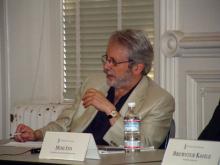What Are Words Worth?12
Jul 21, 2011
'Ilunga’ means a person who is ready to forgive any abuse for the first time, to tolerate it a second time, but never a third time. That’s a word I’ve just imported into English from Tshiluba. A bunch of linguists voted it the world’s hardest word to translate. Then they gave us a translation. I’m so happy to have this word. It allows me to think thoughts that I couldn’t think before. I wonder if Obama is basically an ilunga. My wife is definitely not an ilunga. She’s all over me after my first abuse.
I don’t know about you, but I do most of my thinking in words. If I don’t have the words, how can I have the thoughts? And if you can’t have the thoughts, you can’t make plans. Tonight I’m going to do some schoogling. Until I learned the word, I couldn’t have had that plan.
